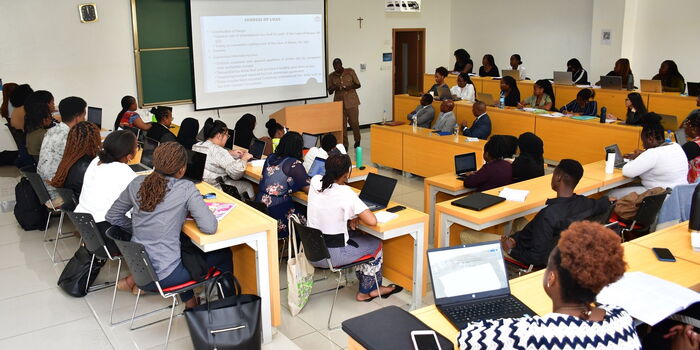Civil Society Warns Murkomen Against Deploying NIS Officers to Universities
Kenyan civil society groups have strongly cautioned Interior Cabinet Secretary Kipchumba Murkomen against sending National Intelligence Service (NIS) officers to universities.
Their reaction comes after Murkomen, on Thursday, February 13, announced the government’s plan to deploy NIS officers to all universities in an effort to combat drug and alcohol abuse among students.
Murkomen justified the move by citing a report from the National Authority for the Campaign Against Drug and Alcohol Abuse (NACADA), which found that over 50% of university students in Kenya consume alcohol and drugs.
He argued that intelligence officers were needed to monitor and curb substance abuse within learning institutions.
However, civil society organizations, led by Suba Churchill from the Kenya National Civil Society Centre (KNCSC), have raised concerns over the plan.
They argue that deploying NIS officers to universities would negatively impact the fundamental freedoms of both students and lecturers, especially their right to learn, express ideas, and engage in academic discussions without fear of surveillance.
According to Churchill, placing undercover intelligence officers in universities, alongside establishing police stations within campuses, would erode academic freedom.
He warned that this move could create a hostile learning environment, making it difficult for students and lecturers to freely research, publish, and innovate.
In a statement signed by Churchill, KNCSC expressed deep skepticism about the government’s true intentions behind deploying intelligence officers to universities.
The organization linked this decision to the rising cases of abductions, forced disappearances, and extrajudicial killings, especially in the wake of recent protests across the country.
“At a time when Kenya is facing widespread cases of abductions and enforced disappearances, we are not convinced that the government’s proposal to deploy NIS officers to universities is well-intentioned,” Churchill stated.
The civil society organizations further argued that the move could violate students’ constitutional rights and undermine their freedoms.
They warned that such measures, initially introduced under the pretext of tackling drug abuse, could be expanded to serve other unintended purposes, restricting democratic rights and personal freedoms.
As a result, they have called on Murkomen and the government to withdraw the proposal entirely, urging authorities to explore alternative ways to address drug and substance abuse in learning institutions.
Their strong opposition comes after Murkomen called for an urgent national conversation on tackling drug abuse in universities through an all-inclusive approach.
According to NACADA’s report, alcohol remains the most accessible substance among university students, with an availability rate of 87.3%. Cigarettes follow at 64.4%, while shisha ranks third at 41.2%.
The debate over the proposed deployment of intelligence officers has sparked a wider conversation on the balance between security measures and the protection of academic freedom in Kenyan universities.
Join Gen Z official Whatsapp Channel To Stay Updated On time the ongoing situation https://whatsapp.com/channel/0029VaWT5gSGufImU8R0DO30


